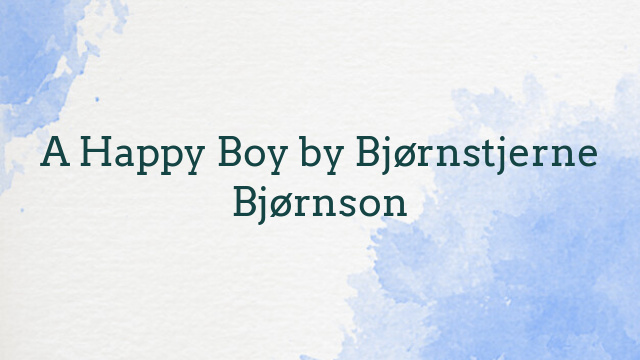
A Happy Boy by Bjørnstjerne Bjørnson
CHAPTER VI
Half a year later—in the autumn it was (the confirmation had been postponed until then)—the candidates for confirmation of the main parish sat in the parsonage servant’s hall, waiting examination, among them was Oyvind Pladsen and Marit Heidegards. Marit had just come down from the priest, from whom she had received a handsome book and much praise; she laughed and chatted with her girl friends on all sides and glanced around among the boys. Marit was a full-grown girl, easy and frank in her whole address, and the boys as well as the girls knew that Jon Hatlen, the best match in the parish, was courting her,—well might she be happy as she sat there. Down by the door stood some girls and boys who had not passed; they were crying, while Marit and her friends were laughing; among them was a little boy in his father’s boots and his mother’s Sunday kerchief.
“Oh, dear! oh, dear!” sobbed he, “I dare not go home again.”
And this overcame those who had not yet been up with the power of sympathy; there was a universal silence. Anxiety filled their throats and eyes; they could not see distinctly, neither could they swallow; and this they felt a continual desire to do.
One sat reckoning over how much he knew; and although but a few hours before he had discovered that he knew everything, now he found out just as confidently that he knew nothing, not even how to read in a book.
Another summed up the list of his sins, from the time he was large enough to remember until now, and he decided that it would not be at all remarkable if the Lord decreed that he should be rejected.
A third sat taking note of all things about him: if the clock which was about to strike did not make its first stroke before he could count twenty, he would pass; if the person he heard in the passage proved to be the gard-boy Lars, he would pass; if the great rain-drop, working its way down over the pane, came as far as the moulding of the window, he would pass. The final and decisive proof was to be if he succeeded in twisting his right foot about the left,—and this it was quite impossible for him to do.
A fourth was convinced in his own mind that if he was only questioned about Joseph in Bible history and about baptism in the Catechism, or about Saul, or about domestic duties, or about Jesus, or about the Commandments, or—he still sat rehearsing when he was called.
A fifth had taken a special fancy to the Sermon on the Mount; he had dreamed about the Sermon on the Mount; he was sure of being questioned on the Sermon on the Mount; he kept repeating the Sermon on the Mount to himself; he had to go out doors and read over the Sermon on the Mount—when he was called up to be examined on the great and the small prophets.
A sixth thought of the priest who was an excellent man and knew his father so well; he thought, too, of the school-master, who had such a kindly face, and of God who was all goodness and mercy, and who had aided so many before both Jacob and Joseph; and then he remembered that his mother and brothers and sisters were at home praying for him, which surely must help.
The seventh renounced all he had meant to become in this world. Once he had thought that he would like to push on as far as being a king, once as far as general or priest; now that time was over. But even to the moment of his coming here he had thought of going to sea and becoming a captain; perhaps a pirate, and acquiring enormous riches; now he gave up first the riches, then the pirate, then the captain, then the mate; he paused at sailor, at the utmost boatswain; indeed, it was possible that he would not go to sea at all, but would take a houseman’s place on his father’s gard.
The eighth was more hopeful about his case but not certain, for even the aptest scholar was not certain. He thought of the clothes he was to be confirmed in, wondering what they would be used for if he did not pass. But if he passed he was going to town to get a broadcloth suit, and coming home again to dance at Christmas to the envy of all the boys and the astonishment of all the girls.
The ninth reckoned otherwise: he prepared a little account book with the Lord, in which he set down on one side, as it were, “Debit:” he must let me pass, and on the other “Credit:” then I will never tell any more lies, never tittle-tattle any more, always go to church, let the girls alone, and break myself of swearing.
The tenth, however, thought that if Ole Hansen had passed last year it would be more than unjust if he who had always done better at school, and, moreover, came of a better family, did not get through this year.
By his side sat the eleventh, who was wrestling with the most alarming plans of revenge in the event of his not being passed: either to burn down the school-house, or to run away from the parish and come back again as the denouncing judge of the priest and the whole school commission, but magnanimously allow mercy to take the place of justice. To begin with, he would take service at the house of the priest of the neighboring parish, and there stand number one next year, and answer so that the whole church would marvel.
But the twelfth sat alone under the clock, with both hands in his pockets, and looked mournfully out over the assemblage. No one here knew what a burden he bore, what a responsibility he had assumed. At home there was one who knew,—for he was betrothed. A large, long-legged spider was crawling over the floor and drew near his foot; he was in the habit of treading on this loathsome insect, but to-day he tenderly raised his foot that it might go in peace whither it would. His voice was as gentle as a collect, his eyes said incessantly that all men were good, his hands made a humble movement out of his pockets up to his hair to stroke it down more smoothly. If he could only glide gently through this dangerous needle’s eye, he would doubtless grow out again on the other side, chew tobacco, and announce his engagement.
And down on a low stool with his legs drawn up under him, sat the anxious thirteenth; his little flashing eyes sped round the room three times each second, and through the passionate, obstinate head stormed in motley confusion the combined thoughts of the other twelve: from the mightiest hope to the most crushing doubt, from the most humble resolves to the most devastating plans of revenge; and, meanwhile, he had eaten up all the loose flesh on his right thumb, and was busied now with his nails, sending large pieces across the floor.
Oyvind sat by the window, he had been upstairs and had answered everything that had been asked him; but the priest had not said anything, neither had the school-master. For more than half a year he had been considering what they both would say when they came to know how hard he had toiled, and he felt now deeply disappointed as well as wounded. There sat Marit, who for far less exertion and knowledge had received both encouragement and reward; it was just in order to stand high in her eyes that he had striven, and now she smilingly won what he had labored with so much self-denial to attain. Her laughter and joking burned into his soul, the freedom with which she moved about pained him. He had carefully avoided speaking with her since that evening, it would take years, he thought; but the sight of her sitting there so happy and superior, weighed him to the ground, and all his proud determinations drooped like leaves after a rain.
He strove gradually to shake off his depression. Everything depended on whether he became number one to-day, and for this he was waiting. It was the school-master’s wont to linger a little after the rest with the priest to arrange about the order of the young people, and afterwards to go down and report the result; it was, to be sure, not the final decision, merely what the priest and he had for the present agreed upon. The conversation became livelier after a considerable number had been examined and passed; but now the ambitious ones plainly distinguished themselves from the happy ones; the latter left as soon as they found company, in order to announce their good fortune to their parents, or they waited for the sake of others who were not yet ready; the former, on the contrary, grew more and more silent and their eyes were fixed in suspense on the door.
At length the children were all through, the last had come down, and so the school-master must now be talking with the priest. Oyvind glanced at Marit; she was just as happy as before, but she remained in her seat, whether waiting for her own pleasure or for some one else, he knew not. How pretty Marit had become! He had never seen so dazzlingly lovely a complexion; her nose was slightly turned up, and a dainty smile played about the mouth. She kept her eyes partially closed when not looking directly at any one, but for that reason her gaze always had unsuspected power when it did come; and, as though she wished herself to add that she meant nothing by this, she half smiled at the same moment. Her hair was rather dark than light, but it was wavy and crept far over the brow on either side, so that, together with the half closed eyes, it gave the face a hidden expression that one could never weary of studying. It never seemed quite sure whom it was she was looking for when she was sitting alone and among others, nor what she really had in mind when she turned to speak to any one, for she took back immediately, as it were, what she gave. “Under all this Jon Hatlen is hidden, I suppose,” thought Oyvind, but still stared constantly at her.
Now came the school-master. All left their places and stormed about him.
“What number am I?”—”And I?”—”And I—I?”
“Hush! you overgrown young ones! No uproar here! Be quiet and you shall hear about it, children.” He looked slowly around. “You are number two,” said he to a boy with blue eyes, who was gazing up at him most beseechingly; and the boy danced out of the circle. “You are number three,” he tapped a red-haired, active little fellow who stood tugging at his jacket. “You are number five; you number eight,” and so on. Here he caught sight of Marit. “You are number one of the girls,”—she blushed crimson over face and neck, but tried to smile. “You are number twelve; you have been lazy, you rogue, and full of mischief; you number eleven, nothing better to be expected, my boy; you, number thirteen, must study hard and come to the next examination, or it will go badly with you!”
Oyvind could bear it no longer; number one, to be sure, had not been mentioned, but he had been standing all the time so that the school-master could see him.
“School-master!” He did not hear. “School-master!” Oyvind had to repeat this three times before it was heard. At last the school-master looked at him.
“Number nine or ten, I do not remember which,” said he, and turned to another.
“Who is number one, then?” inquired Hans, who was Oyvind’s best friend.
“It is not you, curly-head!” said the school-master, rapping him over the hand with a roll of paper.
“Who is it, then?” asked others. “Who is it? Yes; who is it?”
“He will find that out who has the number,” replied the school-master, sternly. He would have no more questions. “Now go home nicely, children. Give thanks to your God and gladden your parents. Thank your old school-master too; you would have been in a pretty fix if it had not been for him.”
They thanked him, laughed, and went their way jubilantly, for at this moment when they were about to go home to their parents they all felt happy. Only one remained behind, who could not at once find his books, and who when he had found them sat down as if he must read them over again.
The school-master went up to him.
“Well, Oyvind, are you not going with the rest?”
There was no reply.
“Why do you open your books?”
“I want to find out what I answered wrong to-day.”
“You answered nothing wrong.”
Then Oyvind looked at him; tears filled his eyes, but he gazed intently at the school-master, while one by one trickled down his cheeks, and not a word did he say. The school-master sat down in front of him.
“Are you not glad that you passed?”
There was a quivering about the lips but no reply.
“Your mother and father will be very glad,” said the school-master, and looked at Oyvind.
The boy struggled hard to gain power of utterance, finally he asked in low, broken tones,—
“Is it—because I—am a houseman’s son that I only stand number nine or ten?”
“No doubt that was it,” replied the school-master.
“Then it is of no use for me to work,” said Oyvind, drearily, and all his bright dreams vanished. Suddenly he raised his head, lifted his right hand, and bringing it down on the table with all his might, flung himself forward on his face and burst into passionate tears.
The school-master let him lie and weep,—weep as long as he would. It lasted a long time, but the school-master waited until the weeping grew more childlike. Then taking Oyvind’s head in both hands, he raised it and gazed into the tear-stained face.
“Do you believe that it is God who has been with you now,” said he, drawing the boy affectionately toward him.
Oyvind was still sobbing, but not so violently as before; his tears flowed more calmly, but he neither dared look at him who questioned nor answer.
“This, Oyvind, has been a well-merited recompense. You have not studied from love of your religion, or of your parents; you have studied from vanity.”
There was silence in the room after every sentence the school-master uttered. Oyvind felt his gaze resting on him, and he melted and grew humble under it.
“With such wrath in your heart, you could not have come forward to make a covenant with your God. Do you think you could, Oyvind?”
“No,” the boy stammered, as well as he was able.
“And if you stood there with vain joy, over being number one, would you not be coming forward with a sin?”
“Yes, I should,” whispered Oyvind, and his lips quivered.
“You still love me, Oyvind?”
“Yes;” here he looked up for the first time.
“Then I will tell you that it was I who had you put down; for I am very fond of you, Oyvind.”
The other looked at him, blinked several times, and the tears rolled down in rapid succession.
“You are not displeased with me for that?”
“No;” he looked up full in the school-master’s face, although his voice was choked.
“My dear child, I will stand by you as long as I live.”
The school-master waited for Oyvind until the latter had gathered together his books, then said that he would accompany him home. They walked slowly along. At first Oyvind was silent and his struggle went on, but gradually he gained his self-control. He was convinced that what had occurred was the best thing that in any way could have happened to him; and before he reached home, his belief in this had become so strong that he gave thanks to his God, and told the school-master so.
“Yes, now we can think of accomplishing something in life,” said the school-master, “instead of playing blind-man’s buff, and chasing after numbers. What do you say to the seminary?”
“Why, I should like very much to go there.”
“Are you thinking of the agricultural school?”
“Yes.”
“That is, without doubt, the best; it provides other openings than a school-master’s position.”
“But how can I go there? I earnestly desire it, but I have not the means.”
“Be industrious and good, and I dare say the means will be found.”
Oyvind felt completely overwhelmed with gratitude. His eyes sparkled, his breath came lightly, he glowed with that infinite love that bears us along when we experience some unexpected kindness from a fellow-creature. At such a moment, we fancy that our whole future will be like wandering in the fresh mountain air; we are wafted along more than we walk.
When they reached home both parents were within, and had been sitting there in quiet expectation, although it was during working hours of a busy time. The school-master entered first, Oyvind followed; both were smiling.
“Well?” said the father, laying aside a hymn-book, in which he had just been reading a “Prayer for a Confirmation Candidate.”
His mother stood by the hearth, not daring to say anything; she was smiling, but her hand was trembling. Evidently she was expecting good news, but did not wish to betray herself.
“I merely had to come to gladden you with the news, that he answered every question put to him; and that the priest said, when Oyvind had left him, that he had never had a more apt scholar.”
“Is it possible!” said the mother, much affected.
“Well, that is good,” said his father, clearing his throat unsteadily.
After it had been still for some time, the mother asked, softly,—
“What number will he have?”
“Number nine or ten,” said the school-master, calmly.
The mother looked at the father; he first at her, then at Oyvind, and said,—
“A houseman’s son can expect no more.”
Oyvind returned his gaze. Something rose up in his throat once more, but he hastily forced himself to think of things that he loved, one by one, until it was choked down again.
“Now I had better go,” said the school-master, and nodding, turned away.
Both parents followed him as usual out on the door-step; here the school-master took a quid of tobacco, and smiling said,—
“He will be number one, after all; but it is not worth while that he should know anything about it until the day comes.”
“No, no,” said the father, and nodded.
“No, no,” said the mother, and she nodded too; after which she grasped the school-master’s hand and added: “We thank you for all you do for him.”
“Yes, you have our thanks,” said the father, and the school-master moved away.
They long stood there gazing after him.
CHAPTER VII
The school-master had judged the boy correctly when he asked the priest to try whether Oyvind could bear to stand number one. During the three weeks which elapsed before the confirmation, he was with the boy every day. It is one thing for a young, tender soul to yield to an impression; what through faith it shall attain is another thing. Many dark hours fell upon Oyvind before he learned to choose the goal of his future from something better than ambition and defiance. Often in the midst of his work he lost his interest and stopped short: what was it all for, what would he gain by it?—and then presently he would remember the school-master, his words and his kindness; and this human medium forced him to rise up again every time he fell from a comprehension of his higher duty.
In those days while they were preparing at Pladsen for the confirmation, they were also preparing for Oyvind’s departure for the agricultural school, for this was to take place the following day. Tailor and shoemaker were sitting in the family-room; the mother was baking in the kitchen, the father working at a chest. There was a great deal said about what Oyvind would cost his parents in the next two years; about his not being able to come home the first Christmas, perhaps not the second either, and how hard it would be to be parted so long. They spoke also of the love Oyvind should bear his parents who were willing to sacrifice themselves for their child’s sake. Oyvind sat like one who had tried sailing out into the world on his own responsibility, but had been wrecked and was now picked up by kind people.
Such is the feeling that humility gives, and with it comes much more. As the great day drew near he dared call himself prepared, and also dared look forward with trustful resignation. Whenever Marit’s image would present itself, he cautiously thrust it aside, although he felt a pang in so doing. He tried to gain practice in this, but never made any progress in strength; on the contrary, it was the pain that grew. Therefore he was weary the last evening, when, after a long self-examination, he prayed that the Lord would not put him to the test in this matter.
The school-master came as the day was drawing to a close. They all sat down together in the family-room, after washing and dressing themselves neat and clean, as was customary the evening before going to communion, or morning service. The mother was agitated, the father silent; parting was to follow the morrow’s ceremony, and it was uncertain when they could all sit down together again. The school-master brought out the hymn-books, read the service, sang with the family, and afterwards said a short prayer, just as the words came into his mind.
These four people now sat together until late in the evening, the thoughts of each centering within; then they parted with the best wishes for the coming day and what it was to consecrate. Oyvind was obliged to admit, as he laid himself down, that he had never gone to bed so happy before; he gave this an interpretation of his own,—he understood it to mean: I have never before gone to bed feeling so resigned to God’s will and so happy in it. Marit’s face at once rose up before him again, and the last thing he was conscious of was that he lay and examined himself: not quite happy, not quite,—and that he answered: yes, quite; but again: not quite; yes, quite; no, not quite.
When he awoke he at once remembered the day, prayed, and felt strong, as one does in the morning. Since the summer, he had slept alone in the attic; now he rose, and put on his handsome new clothes, very carefully, for he had never owned such before. There was especially a round broadcloth jacket, which he had to examine over and over again before he became accustomed to it. He hung up a little looking-glass when he had adjusted his collar, and for the fourth time drew on his jacket. At sight of his own contented face, with the unusually light hair surrounding it, reflected and smiling in the glass, it occurred to him that this must certainly be vanity again. “Yes, but people must be well-dressed and tidy,” he reasoned, drawing his face away from the glass, as if it were a sin to look in it. “To be sure, but not quite so delighted with themselves, for the sake of the matter.” “No, certainly not, but the Lord must also like to have one care to look well.” “That may be; but He would surely like it better to have you do so without taking so much notice of it yourself.” “That is true; but it happens now because everything is so new.” “Yes, but you must gradually lay the habit aside.”—He caught himself carrying on such a self-examining conversation, now upon one theme, now upon another, so that not a sin should fall on the day and stain it; but at the same time he knew that he had other struggles to meet.
When he came down-stairs, his parents sat all dressed, waiting breakfast for him. He went up to them and taking their hands thanked them for the clothes, and received in return a “wear-them-out-with-good-health.”[1] They sat down to table, prayed silently, and ate. The mother cleared the table, and carried in the lunch-box for the journey to church. The father put on his jacket, the mother fastened her kerchief; they took their hymn-books, locked up the house, and started. As soon as they had reached the upper road they met the church-faring people, driving and walking, the confirmation candidates scattered among them, and in one group and another white-haired grand-parents, who had felt moved to come out on this great occasion.
[Footnote 1: A common expression among the peasantry of Norway, meaning: “You are welcome.”]
It was an autumn day without sunshine, as when the weather is about to change. Clouds gathered together and dispersed again; sometimes out of one great mass were formed twenty smaller ones, which sped across the sky with orders for a storm; but below, on the earth, it was still calm, the foliage hung lifeless, not a leaf stirring; the air was a trifle sultry; people carried their outer wraps with them but did not use them. An unusually large multitude had assembled round the church, which stood in an open space; but the confirmation children immediately went into the church in order to be arranged in their places before service began. Then it was that the school-master, in a blue broadcloth suit, frock coat, and knee-breeches, high shoes, stiff cravat, and a pipe protruding from his back coat pocket, came down towards them, nodded and smiled, tapped one on the shoulder, spoke a few words to another about answering loudly and distinctly, and meanwhile worked his way along to the poor-box, where Oyvind stood answering all the questions of his friend Hans in reference to his journey.
“Good-day, Oyvind. How fine you look to-day!” He took him by the jacket collar as if he wished to speak to him. “Listen. I believe everything good of you. I have been talking with the priest; you will be allowed to keep your place; go up to number one and answer distinctly!”
Oyvind looked up at him amazed; the school-master nodded; the boy took a few steps, stopped, a few steps more, stopped again: “Yes, it surely is so; he has spoken to the priest for me,”—and the boy walked swiftly up to his place.
“You are to be number one, after all,” some one whispered to him.
“Yes,” answered Oyvind, in a low voice, but did not feel quite sure yet whether he dared think so.
The assignment of places was over, the priest had come, the bells were ringing, and the people pouring into church. Then Oyvind saw Marit Heidegards just in front of him; she saw him too; but they were both so awed by the sacredness of the place that they dared not greet each other. He only noticed that she was dazzlingly beautiful and that her hair was uncovered; more he did not see. Oyvind, who for more than half a year had been building such great plans about standing opposite her, forgot, now that it had come to the point, both the place and her, and that he had in any way thought of them.
After all was ended the relatives and acquaintances came up to offer their congratulations; next came Oyvind’s comrades to take leave of him, as they had heard that he was to depart the next day; then there came many little ones with whom he had coasted on the hill-sides and whom he had assisted at school, and who now could not help whimpering a little at parting. Last came the school-master, silently took Oyvind and his parents by the hands, and made a sign to start for home; he wanted to accompany them. The four were together once more, and this was to be the last evening. On the way home they met many others who took leave of Oyvind and wished him good luck; but they had no other conversation until they sat down together in the family-room.
The school-master tried to keep them in good spirits; the fact was now that the time had come they all shrank from the two long years of separation, for up to this time they had never been parted a single day; but none of them would acknowledge it. The later it grew the more dejected Oyvind became; he was forced to go out to recover his composure a little.
It was dusk now and there were strange sounds in the air. Oyvind remained standing on the door-step gazing upward. From the brow of the cliff he then heard his own name called, quite softly; it was no delusion, for it was repeated twice. He looked up and faintly distinguished a female form crouching between the trees and looking down.
“Who is it?” asked he.
“I hear you are going away,” said a low voice, “so I had to come to you and say good-by, as you would not come to me.”
“Dear me! Is that you, Marit? I shall come up to you.”
“No, pray do not. I have waited so long, and if you come I should have to wait still longer; no one knows where I am and I must hurry home.”
“It was kind of you to come,” said he.
“I could not bear to have you leave so, Oyvind; we have known each other since we were children.”
“Yes; we have.”
“And now we have not spoken to each other for half a year.”
“No; we have not.”
“We parted so strangely, too, that time.”
“We did. I think I must come up to you!”
“Oh, no! do not come! But tell me: you are not angry with me?”
“Goodness! how could you think so?”
“Good-by, then, Oyvind, and my thanks for all the happy times we have had together!”
“Wait, Marit!”
“Indeed I must go; they will miss me.”
“Marit! Marit!”
“No, I dare not stay away any longer, Oyvind. Good-by.”
“Good-by!”
Afterwards he moved about as in a dream, and answered very absently when he was addressed. This was ascribed to his journey, as was quite natural; and indeed it occupied his whole mind at the moment when the school-master took leave of him in the evening and put something into his hand, which he afterwards found to be a five-dollar bill. But later, when he went to bed, he thought not of the journey, but of the words which had come down from the brow of the cliff, and those that had been sent up again. As a child Marit was not allowed to come on the cliff, because her grandfather feared she might fall down. Perhaps she will come down some day, any way.




